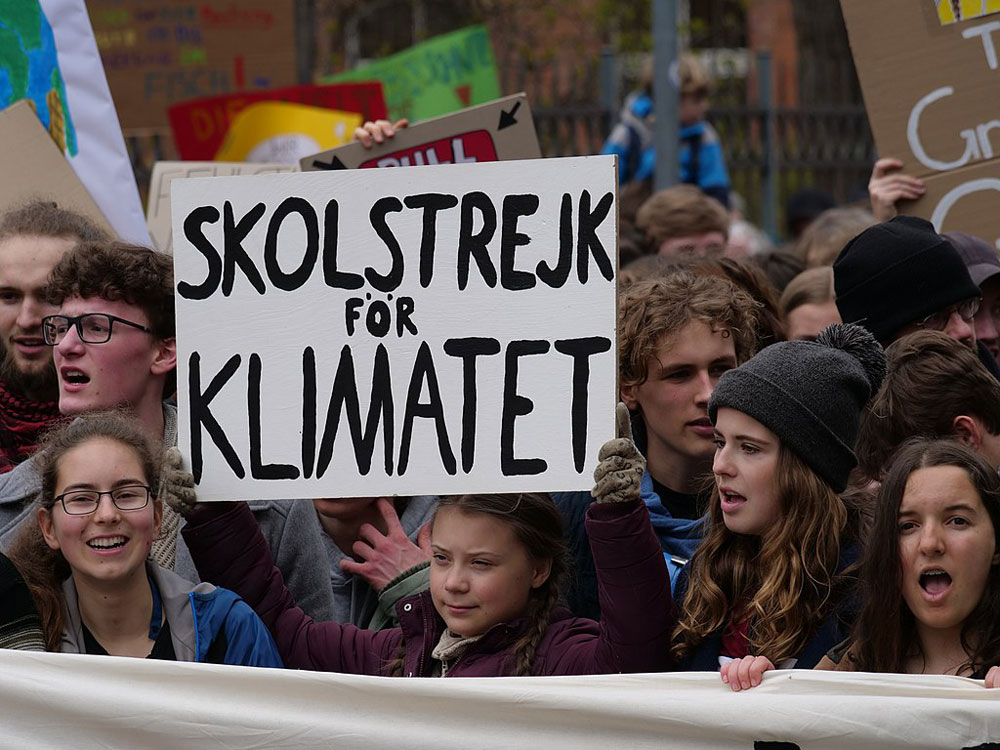
December 11, 2019; Time
Sometimes the most important lessons in school happen outside the classroom. Certainly, this was the case for Time Magazine’s 2019 Person of the Year, 16-year-old Greta Thunberg, who, as Time explains, “began a global movement by skipping school, starting in August 2018.”
A protest action that began with camping out alone in front of the Swedish Parliament, holding a sign painted in black letters on a white background that read Skolstrejk för klimatet—“School Strike for Climate”—has expanded far further than Thunberg could have imagined.
By March 2019, the movement had grown from a lone high school student to 1.4 million students skipping school and participating in protest actions in 2,000 cities and 120 countries. That alone would have been astonishing, but then the movement really grew. In August, Thunberg traveled across the Atlantic to a United Nations conference in New York in a sailboat to highlight the importance of less carbon-intensive modes of travel. On September 20, 2019, four million people joining a global climate strike, in what widely acknowledged to be, as Eliza Barclay and Brian Resnick in Vox put it, “the largest climate protest in human history.”
In Time, Charlotte Alter, Suyin Haynes, and Justin Worland break down some of the numbers behind that massive coordinated set of demonstrations:
In New York City, 250,000 reportedly marched in Battery Park and outside City Hall. In London, 100,000 swarmed the streets near Westminster Abbey, in the shadow of Big Ben. In Germany, a total of 1.4 million people took to the streets, with thousands flooding the Brandenburg Gate in Berlin and marching in nearly 600 other cities and towns across the country.
Sign up for our free newsletters
Subscribe to NPQ's newsletters to have our top stories delivered directly to your inbox.
By signing up, you agree to our privacy policy and terms of use, and to receive messages from NPQ and our partners.
Shortly after the global protest, Thunberg gave voice to the demands of the four million young climate marchers, telling heads of state at the UN General Assembly, “We are in the beginning of a mass extinction, and all you can talk about is money and fairy tales of eternal economic growth. How dare you.”
Back in Thunberg’s home of Sweden, the Time team indicates that climate actions are affecting the transportation industry, reporting that, “There was an eight percent drop in domestic flights between January and April according to Swedavia, which runs the nation’s airports, and Interrail ticket sales have tripled over the past two years.”
As Alter and her colleagues write, the climate actions led by youth across the globe are part of a rising tide “of youth activists across the globe fighting for everything from gun control to democratic representation.” The global climate strike may be the most visible indicator, but, as Alter, Haynes and Worland write, “it’s hardly the only one: teenagers in the US are organizing against gun violence and flocking to progressive candidates; students in Hong Kong are battling for democratic representation; and young people from South America to Europe are agitating for remaking the global economy.”
Thunberg herself, by the way, cites the March for Our Lives protest in March 2018 in the US as helping inspire her action. She even wrote an essay in a Swedish newspaper in May 2018 about climate change that explicitly proposed emulating the students from Marjory Stoneman Douglas High School.
As NPQ’s Marian Conway noted last year, “a new generation is stepping up to change the world.” Last month, NPQ ran an article by Juliette Kang Stableski and Katie Kirchner that pointed to this trend. “Students and youth have more to bring to the table than just votes; look no further than the survivors of the Parkland shooting in Florida to see how young people were able to channel their lived experience into a national advocacy movement through March for Our Lives. Or how young Black activists have built movements that have responded to the trauma of police brutality,” they write. Youth engagement, they note, “is key to democratic progress.”—Steve Dubb










